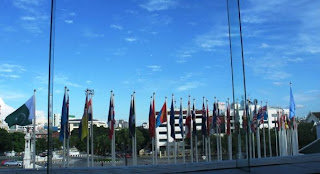
COP16 MEXICO MIGRATION THE ONLY WAY OUT
Climate change migration crisis is no longer an understatement, COP16 Mexico migration should receive highest attention, dialogue between developed and developing countries.
Scientist have affirmed the warming of the climate system and linked it to human activities. This is justified by the increase in the average surface temperature by about 0.6 C.
Development is about expanding human potential and enlarging human freedom. It is about people developing the capabilities that empower them to make choices that they value most.
Climate change threatens to erode human freedoms and limit choice. It calls into question the enlightment principle that human progress will make the future look better than the past.
The early warning signs are already visible for everybody to see. In Ghana and other developing countries, millions of the world's poorest people are already being forced to cope with the impacts of climate change. These impacts do not register as apocalyptic events in the full glare of world media attention. They go unnoticed in financial markets and in the measurement of the world Gross Domestic Product (GDP).
However, increased exposure to drought, to more intense storms, to floods and environmental stress is holding back efforts of the world's poor to build a better life for themselves and their children.
The starting point for avoiding dangerous climate change is recognition of three distinctive features of the problem. There are no rewind buttons for running down stocks. People living at the start of the 22nd Century will live with consequences of our emissions just as we are living with the consequences of emissions since the industrial revolution.
For instance for the first half of this 21st Century the world in general, especially the poor will have to live with climate change to which are already committed.
In the last three decades, about 22 countries in Africa have been affected by flood and 1.5 million people have been displaced, whilst at least 300 people have been killed.
The fact that climate change also is worsening the migration crisis is no longer an understatement. The droughts, the terrible floods caused by severe storms, water contamination, soil erosion and degradation, as well as other destructive impacts of the neoliberal environmental disaster are bringing about the displacement of thousands of people, mainly women and ruined farmers, from their rural communities and forcing them towards the cities and the North in a desperate search for the means of survival for them and their families.
It is estimated that 50 million people have been forced to migrate due to the effects of climate change. These “climate displaced persons” have come to swell the ranks of the more than 300 million people, according to the International Organization for Migration (IOM), that today represent the worse crisis of migration that humanity has faced.
Unfold. As sea levels rise and tropical storms gather in intensity, millions of people face displacement. Dryland inhabitants, some of the most vulnerable on our planet, have to cope with more frequent and more sustained droughts. And as glaciers retreat, water supplies are being put at risk".
Ghana is part of this pending global disaster. Unfortunately it has not been given the needed attention in country to mitigate its impact in the future. Very rare do we hear of any discussion on climate change by the leadership of this country.
The consistent human activities in the industrial areas, emission of greenhouse gases, bush fires, felling of trees and the discovery of oil which will lead to the sitting of oil companies puts Ghana in a more dangerous position in the coming years.
The recent flood that hit the Northern, Upper East, Upper West and Western Regions in September 2010 revealed the nations vulnerability. The following were the statistics that were recorded by the Ministry of Interior with regards to the flood;
Number of deaths - 16
Number Displaced - 31,360
Houses Destroyed– 34,919
Roads Damaged - 45
Farmlands Destroyed - 6,85
Dams & Bridges Destroyed – 13
e extent of damage in the area disclosed that about 3000 people mostly women and children had been displaced by the floods, with more than 200 buildings at both sides of the Buipe toll booth badly affected. http://news.myjoyonline.com/news/201010/54989.asp
The economic, health and social cost of this flood was so enormous that donor agencies, philanthropist and companies had to come in to support the victims.There exist a gap between scientific evidence of what is happening and political actions.
Climate change is a challenge that needs to be addressed now to reduce the risk it poses to the youth of today and generations unborn. The future generation of this country stands directly in harm's way and they have the least resources to cope.
The coalition urges the various political parties to show commitment to the issue through their campaign messages. They must know that no meaningful development can be done if the climate is not favourable.
Please call 0244023651 E-mail: amoatengken@gmail.com for further enquiries
Kenneth Nana Amoateng
--
"when the voice of the people become so loud the government has no alternative but to listen" Martin Luther King Jnr.
John F. Kennedy once observed that “our problems are man-made, therefore they may be solved by man.”
Kenneth Nana Amoateng
AYICC West African Coordinator
Abibimman Foundation
Ghana National Youth Coalition on Climate Change (GNYCCC)
GCAP/MDGs-Ghana
FoodSPAN
IDAY-GHANA
P.O.BOX BT 1 Tema
Flat 1/A 74 Site 3
(OPP T.DC),Commmunit 1
Tema-Ghana/African
E-Mail: amoatengken@yahoo.com
http://www.abibimman.org
http://www.1010global.org/gh
Tel# 233-0303-213918
Mob:233244023651
skype:kenneth.nana.amoateng
I'm on assignment to my generation.















